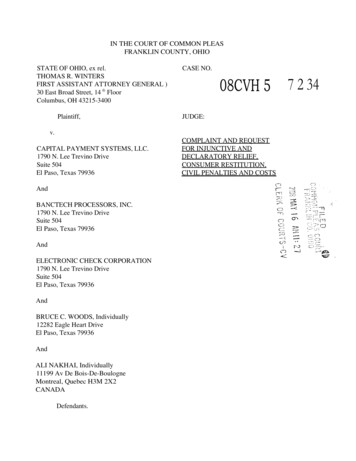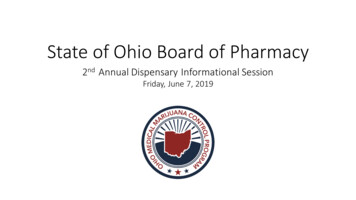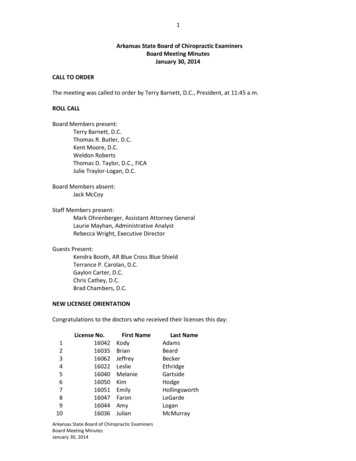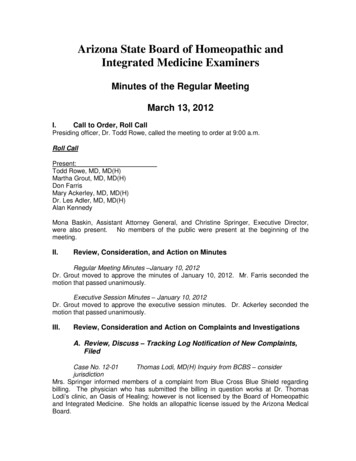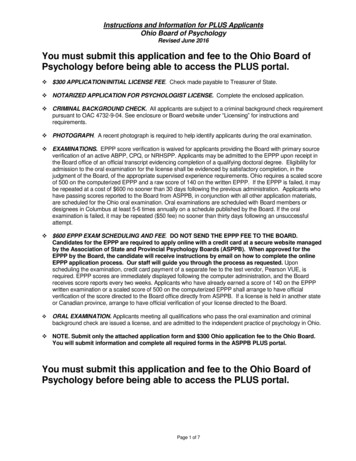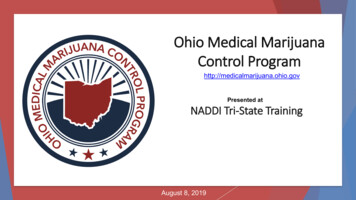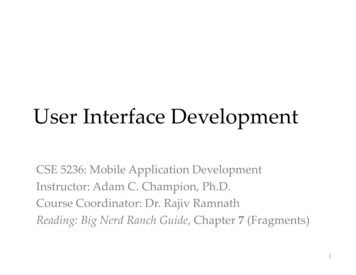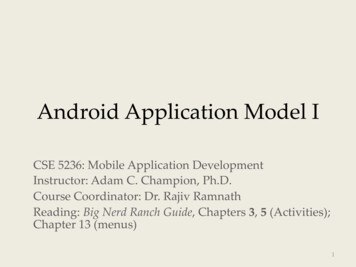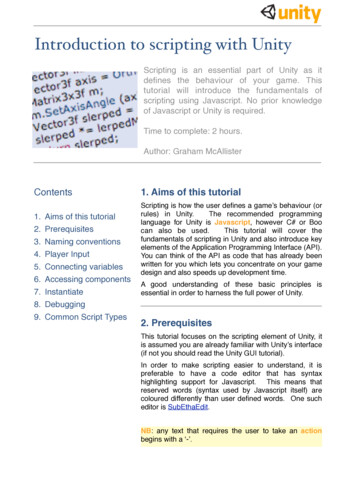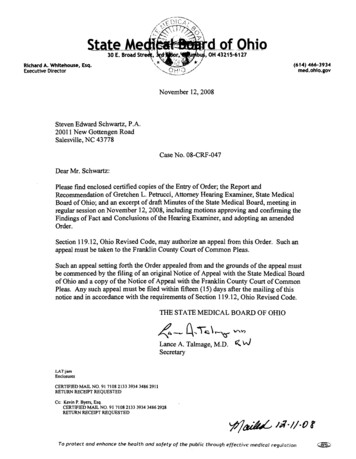
Transcription
Matter of Steven Edward Schwartz, P.A.Case No. 08-CRF-047Page 2Appearances at the HearingNancy H. Rogers, Attorney General, by Karen A. Unver, Assistant Attorney General, on behalfof the State of Ohio.Kevin P. Byers, Esq., on behalf of Mr. Schwartz.EVIDENCE EXAMINEDTestimony HeardSteven Edward Schwartz, P.A.Exhibits ExaminedState’s Exhibits 1A through 1E: Procedural exhibits.State’s Exhibit 2: March 12, 2008, letter to Steven Edward Schwartz, P.A., from KarenMortland, Board Enforcement Attorney, with enclosures.State’s Exhibit 3: April 2, 2008, letter to Ms. Mortland from Glenbeigh Hospital.State’s Exhibit 4: Affidavit of Ms. Mortland, with attachments.Respondent’s Exhibit A: Cover letter and Mr. Schwartz’s treatment records from SpencerRecovery Centers Florida, Inc. [Admitted under seal.]Respondent’s Exhibit B: Statement of standards and services for inpatient treatment at SpencerRecovery Centers Florida, Inc./Dr. Paul’s at the Bay.Respondent’s Exhibit C: August 21, 2008, letter from Alcohol and Drug Services of GuernseyCounty. [Admitted under seal.]Respondent’s Exhibit D: August 12, 2008, letter from David D. Goldberg, D.O.Respondent’s Exhibits E and E1: Recovery support group attendance logs from August 11through September 21, 2008. [Admitted under seal.]Respondent’s Exhibits F1 and F2: Drug screen results from August and September 2008.Respondent’s Exhibit G: June 2008 aftercare contract between Mr. Schwartz and Alcoholand Drug Services of Guernsey County. [Admitted under seal.]
Matter of Steven Edward Schwartz, P.A.Case No. 08-CRF-047Page 3Respondent’s Exhibit H: Mr. Schwartz’s examination records from Glenbeigh Hospital.[Admitted under seal.]PROCEDURAL MATTERThe Hearing Examiner held the record open to allow the Respondent the opportunity to provideadditional exhibits. (Hearing Transcript at 78-86) Two additional exhibits were submitted: (1) anaftercare contract between Mr. Schwartz and Alcohol and Drug Services of Guernsey County wasmarked as Respondent’s Exhibit G, and (2) Mr. Schwartz’s examination records from GlenbeighHospital were marked as Respondent’s Exhibit H. During a conference call held on October 9,2008, the State reasserted its previous argument regarding the relevance of Respondent’s Exhibit H.The State did not object to Respondent’s Exhibit G. The Hearing Examiner overruled the objectionand admitted both additional exhibits. The record closed on October 10, 2008.SUMMARY OF THE EVIDENCEAll exhibits and the transcript, even if not specifically mentioned, were thoroughly reviewed andconsidered by the Hearing Examiner prior to preparing this Report and Recommendation.Mr. Schwartz’s Background and His Physician Assistant Certificate1.Steven Edward Schwartz, P.A., was born in 1949. He attended the University of Michigan forthree years, but did not earn a degree. After travelling and working in several positions in theCleveland, Ohio area, he returned to school and, in approximately 1975, earned a nursingdegree from a community college in the Cleveland area. He practiced as a registered nursefor approximately two years in the Cleveland area. (Hearing Transcript [Tr.] at 10-12; OhioE-License Center, Sept. 23, 2008, https://license.ohio.gov/Lookup )2.In approximately 1977, Mr. Schwartz entered the Cuyahoga County Community CollegeSurgical Physician Assistant Program. He graduated in 1979 with a physician assistant [PA]degree. (Tr. at 11)3.Although he had a PA degree, Mr. Schwartz continued to work as a registered nurse for fivemore years, noting that he had enjoyed emergency medicine, and therefore had not immediatelytaken a PA position. During those five years, he worked in emergency rooms in the Clevelandarea and worked as a “house officer” for the Lakewood Hospital System in Painesville, Ohio.(Tr. at 12-14)4.In the mid-1980s, the Board issued a certificate to Mr. Schwartz, authorizing him to practiceas a PA in Ohio. Also in the mid-1980s, he began working as a PA with Lake EmergencyServices, in the emergency rooms of several northeast Ohio medical centers. He remained inthat position for 12 years. (Tr. at 12; Ohio E-License Center, Sept. 23, 2008, https://license.ohio.gov/Lookup )
Matter of Steven Edward Schwartz, P.A.Case No. 08-CRF-047Page 45.In approximately 1997, Mr. Schwartz took a PA position with Southeastern Ohio RegionalMedical Center in Cambridge, Ohio. He has worked there for approximately 11.5 years. (Tr. at12-13)6.The Board summarily suspended Mr. Schwartz’s PA certificate on April 9, 2008. (State’sExhibit [St. Ex.] 1 at 3)2008 Board-Ordered Impairment Examination and Mr. Schwartz’s Responses7.In a letter dated March 7, 2008, the Board Secretary ordered Mr. Schwartz to submit to a 72hour, inpatient examination at Glenbeigh Hospital [Glenbeigh] in Rock Creek, Ohio, on March17, 2008. (St. Ex. 2 at 2-5; St. Ex. 4 at 3-6) The basis for ordering an inpatient examinationwas set forth in the letter and is summarized as follows: In March 1997, Mr. Schwartz pleaded guilty and was found guilty ofDriving under the Influence [DUI], a misdemeanor, in violation ofSection 4511.19(A), Ohio Revised Code. Despite that DUI conviction, Mr. Schwartz answered “No” in December1999 to the question on his PA certificate renewal application, whichasked: “At any time since signing your last application for renewal ofyour registration, have you * * * [b]een found guilty of, or pled guiltyor no contest to a felony or misdemeanor?” In February 2008, Mr. Schwartz appeared at the offices of the Board inorder to renew his PA certificate. Two staff members assisting himnoticed an odor of alcohol on him. His appearance was disheveled andhis clothing appeared dirty. On March 5, 2008, a Board Investigator spoke with Mr. Schwartz athis home. The Investigator noticed empty beer cans and beer casesnear the driveway and in the garage. Additionally, the investigatorobserved Mr. Schwartz consuming beer, smelled alcohol on him,noticed that his eyes were bloodshot and watery, and noticed hisspeech was slurred. During the conversation, Mr. Schwartz made anumber of admissions regarding his past and then-present consumptionof alcohol.The letter also explained that the estimated cost for the evaluation was 1,800, which must bepaid prior to beginning the examination. Mr. Schwartz was required to confirm his plan toappear for the examination by contacting Glenbeigh. Additionally, Mr. Schwartz was informedthat failure to submit to the examination “constitutes an admission of the allegations against [him]unless the failure is due to circumstances beyond [his] control.” (St. Ex. 2 at 5; St. Ex. 4 at 6)
Matter of Steven Edward Schwartz, P.A.Case No. 08-CRF-047Page 58.The March 7 letter was personally served upon Mr. Schwartz on March 10, 2008, by a BoardInvestigator. (St. Ex. 4 at 7)9.Karen Mortland was the Board Enforcement Attorney who coordinated the investigation ofMr. Schwartz. In an affidavit, Ms. Mortland stated that she had spoken with Mr. Schwartz onMarch 10, 2008, and he had told her that “he was leaving for Florida on March 11, 2008, foran education seminar and family visit, and that he would not return until the evening of March18, 2008.” She further stated that, after she had received, via facsimile, further informationfrom Mr. Schwartz regarding his trip and his work schedule, she obtained permission fromthe Board’s Secretary and Supervising Member to reschedule his inpatient examination to atime that was more workable for Mr. Schwartz. (St. Ex. 4 at 1)At hearing, Mr. Schwartz confirmed this summary of the events and conversation. (Tr. at 1920, 48-49)10.The inpatient examination at Glenbeigh was rescheduled for March 31, 2008, at 10:00 a.m.Ms. Mortland averred that she had spoken with Mr. Schwartz a second time on March 10,2008, and informed him of the new examination date/time. Additionally, she confirmed thenew examination date in a letter dated March 12, 2008, which was personally served uponMr. Schwartz on March 20, 2008. (St. Ex. 4 at 1-2, 8-13)11.On March 31, 2008, Ms. Mortland received, via facsimile, a letter from Mr. Schwartz, statingthat he would not be attending the inpatient examination at Glenbeigh because he could notafford it. Mr. Schwartz also stated that he had notified Glenbeigh directly that he would notattend. (St. Ex. 4 at 2, 14-16)12.Glenbeigh confirmed that Mr. Schwartz had not appeared for the Board-ordered examination,and Glenbeigh further stated that Mr. Schwartz had not contacted Glenbeigh directly. (St. Ex. 4at 2, 17)13.Mr. Schwartz acknowledged that he did not appear for the Board-ordered examination. Also,Mr. Schwartz testified that he had fully intended to inform Glenbeigh that he would notattend the examination. He admitted that he had not in fact notified Glenbeigh, and admittedthat he should have notified Glenbeigh. (Tr. at 21, 22, 51)Mr. Schwartz’s Admissions and Explanation14.Mr. Schwartz admitted that he is an alcoholic. He explained that, until recently, he had beena “binge drinker,” and, typically on his days off, he had started drinking in the mornings andgot drunk. (Tr. at 18, 46, 54, 65-66)15.Mr. Schwartz also testified that he had planned to attend the Glenbeigh examination asrescheduled. However, approximately two days before March 31, 2008, he concluded that,financially, he simply could not afford it. He explained that he had no money and had nearly 70,000 of debt at that time. (Tr. at 21, 50-51, 54)
Matter of Steven Edward Schwartz, P.A.Case No. 08-CRF-04716.Page 6Mr. Schwartz noted that, in March 2008, he was still drinking, and was being treated fordepression. He described his world at that time as not on “an even keel,” and noted that hewas not making good decisions. (Tr. at 21) Mr. Schwartz testified that, instead of rationallyhandling his affairs, he drank alcohol:John Q Public would say I was drunk. You’re never drunk enough whenyou’re an alcoholic. You know, I mean, it’s not enough. I was under theinfluence, yes. And I blew [the examination] off as I did a lot of things in mylife when I was in active drinking, and I blew it off. I should have called thepeople at Glenbeigh. That definitely was another one of my mistakes.(Tr. at 21-22)17.Mr. Schwartz testified, however, that a subsequent event on April 4, 2008, caused him torealize that he truly needed help for chemical dependency/substance abuse. 1 Mr. Schwartzexplained that, on April 4, 2008, he went to work as scheduled. However, he had consumedalcohol the prior evening, and had been under the influence of alcohol the following morning.Mr. Schwartz stated that, shortly after his arrival at work, he had realized that he was underthe influence and had notified his employer that he needed to leave for the day. Mr. Schwartzreturned home and looked in the telephone book for professional assistance. (Tr. at 23, 54)Mr. Schwartz stated that he had called an 800 telephone number that was listed in his telephonebook under “Alcohol Services.” He spoke at length with a man named “Michael Day.”Mr. Schwartz could not explain what entity Mr. Day works for, but noted that they had hadseveral conversations. Mr. Schwartz agreed to enter an inpatient treatment program (as hebelieved his insurance would provide coverage), and Mr. Day proposed a program calledSpencer Recovery Centers Florida Inc./Dr. Paul’s at the Bay [Spencer], located in Florida.Mr. Schwartz agreed to the Spencer program because he has family members who residenearby in Florida. Mr. Schwartz also testified that he did not contact Glenbeigh, the Board, orany other treatment facilities in Ohio or elsewhere. Nor did he look into the costs andavailability of different treatment programs. Mr. Schwartz did, however, determine that theSpencer program was accredited by the Joint Commission on the Accreditation of HealthcareOrganizations, with which he was familiar due to his employment. (Tr. at 24-26, 31, 55-58,70, 72-73)18.Mr. Schwartz testified that his “sobriety date” for alcohol is April 7, 2008. He explained thathe had stopped using alcohol on April 4, 2008, but it took several days for him to “taperdown” or “detox.” He also testified that he had last used marijuana in March 2008. (Tr. at22-23, 30)19.Mr. Schwartz acknowledged that the cost of the Spencer program was greater than the cost ofthe three-day evaluation at Glenbeigh. He explained that, in order to pay for the Spencer1Mr. Schwartz stated unequivocally that the Board-ordered examination did not play a role in his April 4, 2008, decisionto seek treatment for chemical dependency/substance abuse. (Tr. at 55)
Matter of Steven Edward Schwartz, P.A.Case No. 08-CRF-047Page 7program, he had “cashed in” a retirement annuity that he had held for many years. He testifiedthat he had had no other means to pay for treatment, and had concluded in April 2008 that hisneed for treatment was a priority. He also noted that, prior to entering the Spencer program, hehad paid bills in advance so that he would not fall into a worse financial status. (Tr. at 24, 69)20.Mr. Schwartz testified that he did not select the Spencer program in order to avoid Boardscrutiny or otherwise be noncompliant with Board requirements. He believes that he had notbeen thinking rationally due to his alcoholism. However, he stated that he had tried to beaggressive in obtaining treatment for his survival, and “someone threw me a life ring, and Igrabbed it.” (Tr. at 26-27, 59, 69) The following exchange reflects that explanation:Q.So if you could cash in the annuity to go to the Spencer Group, whycouldn’t you cash the annuity in to go to the three-day evaluation inMarch at Glenbeigh?A.I was in active alcoholism. I didn’t have any money. I guess I justdidn’t comb things out.Q.You didn’t have any money but for the annuity that you didn’t want tocash in?A.Well, I had [the annuity] since 1967, when I first started going to theUniversity of Michigan. And that’s supposed to be left for yourretirement. And that’s the – that is the last, you know, that is the lastresort that kind of thing.Q.You’ve taken that last resort to go to Spencer?A.Yes, I did. That is what I paid for Spencer with.(Tr. at 35-36)Mr. Schwartz’s 2008 Inpatient Treatment in Florida21.On April 16, 2008, Mr. Schwartz entered the treatment program at a Spencer location in St. PeteBeach, Florida, to undergo inpatient treatment. 2 That facility is not a Board-approvedtreatment provider. A drug screen taken upon admission to Spencer was positive for marijuanaand negative for alcohol. All subsequent drug screens taken during treatment were negative.(Resp. Ex. A at 1, 8; Tr. at 29)22.Mr. Schwartz successfully completed that 28-day treatment and was discharged on May 14,2008. The treatment program at Spencer included family, group and individual counseling.2This treatment began shortly after the Board ordered a summary suspension of Mr. Schwartz’s PA certificate on April9, 2008.
Matter of Steven Edward Schwartz, P.A.Case No. 08-CRF-047Page 8In particular, Mr. Schwartz participated in group therapy, one-on-one sessions with the primarycounselor, 12-step recovery group sessions, and random drug screens and breathalyzer tests.The program also provided life skills training, such as anger management, communicationskills, “employable skills,” problem solving, recovery management, decision-making,relationship skills, symptom management, nutrition, and health/medical issues. The primarycounselor at Spencer stated that Mr. Schwartz was “cooperative, engaged, and motivatedthroughout treatment, and his prognosis upon discharge on 05/14/08 was good.” (Resp. Ex. Aat 1-3; Resp. Ex. B)23.Mr. Schwartz described the typical day in the Spencer treatment program as follows:We have two [Alcoholics Anonymous] meetings a day. We get up. Our first[Alcoholics Anonymous] meeting is at 7:00 o’clock, a.m. We have an hourlong [Alcoholics Anonymous] meeting.After that, we break for breakfast. After that, we go to a – sometimes it’s ameditation class, it will be on meditation and how it relates to recovery. Othertimes, it may be a film or it could be a therapy class, like, say, we cut thingsout of magazines, but it was like all the words that pertain to before recovery.And on the other side of the three by five card, the way we hope it to be, whatwe wish recovery to be. So it’s the positive – both sides of the coin. So wehave various little therapies.Then the next hour, we will have a – it will be a lecture on the pitfalls torecovery and recovery-related issues. We have an optional class, which is anindependent bible study, which I took place in bible study. We read from ourrecovery bible, that is specifically related to the 12 different steps in the bibleverses. We had a preacher that led that. A pastor, preacher. And then I wentto his church on Sundays. I started attending church while I was in there.In the evening – we also had another [Alcoholics Anonymous] meeting in theevening. In the evening, we had free time, we can attend the gym or read orstudy. I managed to read the Big Book [a recovery-related text] in my freetime cover to cover while I was in there.***We would have to be in our room, ready to call it a day at 10:00 p.m., at whichtime they’d come around with [an] alcohol meter, something that you blow inand recorded your readings, you know, in a logbook for everyone, and thatwould be it.***
Matter of Steven Edward Schwartz, P.A.Case No. 08-CRF-047Page 9Once or twice a week we would have – they would do a swab, a buccal swabthat would read drugs and alcohol. And when I came in, I had a urine test.And when I went out, I had a urine test.(Tr. at 27-29) Mr. Schwartz also stated that he had met with a licensed physician three orfour times during his stay. (Tr. at 60)24.Mr. Schwartz’s diagnosis from Spencer was “alcohol dependence” and “cannabis abuse.”Depression, resentment and “PRN involvement”3 were also noted as problems for Mr. Schwartz.(Resp. Ex. A at 3, 7)Mr. Schwartz’s Post-Treatment Activities25.Mr. Schwartz explained that he abstains from alcohol and drugs except for aspirin, Naprosyn,and other prescribed medications. He noted that he feels healthy and strong in his recovery.Mr. Schwartz noted that, between the time he had returned to Ohio in May 2008 and thehearing in September 2008, he had not experienced any “shaky” moments in his recovery.Moreover, he feels that he has the tools to deal with things, such as coping skills, not beingresentful, and accepting that there is a “higher power.” (Tr. at 38, 61, 64) He testified:I feel so much happier since I got some tools from this and realize this isdefinitely a problem. Yeah, I feel good about it. And I think a three-day evalwould give the medical board something to go on. I mean, I feel confidentenough that I suggested it myself that if they want an eval, I’d go get one.(Tr. at 42)26.Mr. Schwartz executed an aftercare contract with Alcohol and Drug Services of GuernseyCounty, which requires among other things that he participate in a treatment program andparticipate in all prescribed therapy programs and activities. (Tr. at 31, 33, 70-71; Resp. Ex. G)27.Mr. Schwartz receives counseling, on average once every 10 days, from a licensed counselorat Alcohol and Drug Services of Guernsey County. (Tr. at 31, 33) That counselor, MariannaWilliamson, wrote a letter in August 2008 regarding Mr. Schwartz’s status, stating in part:He appears very motivated to maintain his recovery. * * * Steven has adetermination to make his recovery work and is working toward that. If hecontinues his prognosis is very good.(Resp. Ex. C)3It is not clear from the Spencer documentation what “PRN involvement” means. It is possible that it is a reference tothe Physicians Recovery Network. Mr. Schwartz stated that he had been working with that group to address disabilityinsurance and licensure issues. (Tr. at 68)
Matter of Steven Edward Schwartz, P.A.Case No. 08-CRF-047Page 1028.Mr. Schwartz attends, on average, seven recovery group meetings each week, and finds t
Spencer Recovery Centers Florida Inc./Dr. Paul’s at the Bay [Spencer], located in Florida. Mr. Schwartz agreed to the Spencer program because he has family members who reside nearby in Florida. Mr. Schwartz also t
